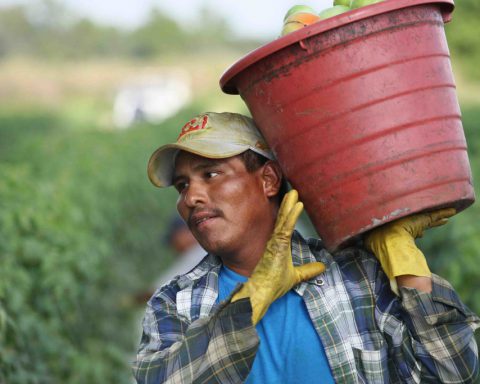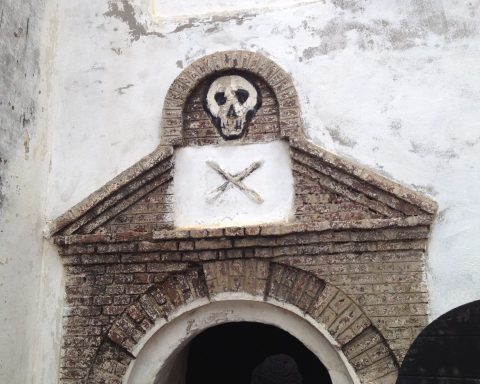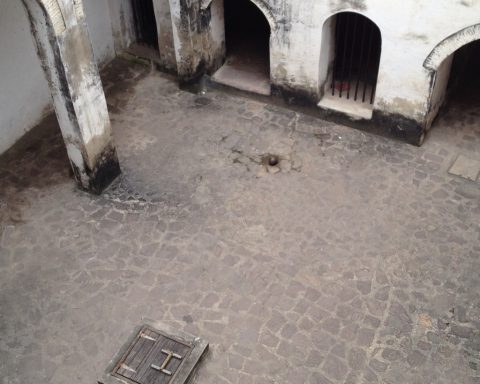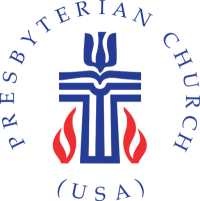Then they sat down to eat; and looking up they saw a caravan of Ishmaelites coming from Gilead, with their camels carrying gum, balm, and resin, on their way to carry it down to Egypt. Then Judah said to his brothers, “What profit is it if we kill our brother and conceal his blood? Come, let us sell him to the Ishmaelites, and not lay our hands on him, for he is our brother, our own flesh.” And his brothers agreed. When some Midianite traders passed by, they drew Joseph up, lifting him out of the pit, and sold him to the Ishmaelites for twenty pieces of silver. And they took Joseph to Egypt.
—Genesis 37:25-28

Through the story of Joseph, the Hebrew Testament reveals to us that human betrayal and enslavement are as ancient as the sands of the Negev. Twenty pieces of silver and, out of his brothers’ jealously and greed, Joseph’s future was forever changed for a life of wretched enslavement. Joseph’s story was originally told in the context of a world where slavery was commonplace, a perspective that is not usually lifted up in our bible study groups. I invite you to engage with that world’s enduring legacy today.
We remember Joseph’s story for its arc of improbable redemption: in it, God makes opportunities out of this wickedness so that even Joseph’s brothers later benefit greatly from the grace of the Most High. But what about those years before Joseph became the powerful man who saved his family from starvation and death? It did not go so well for him…and that is how the story is lived out by millions—MILLIONS—in our world.
According to International Justice Mission, 45+ million people are enslaved in the world today, right now. Children as young as 4 years old are made to work long hours with little to eat and hardly enough rest; they are beaten if they dare act like children do at age 4. What was your childhood like? Mine was filled with good food, rest, play, education, love and care. Not so for those who are enslaved.
___________________________________________
Today’s slavery is not that of a conquering nation, but it still involves preying upon those with less power.
___________________________________________
Many hear ‘slavery’ and they think only about the enslavement of people who were stolen from their homes in Africa and then the continued enslavement of their descendants–as if slavery were something encapsulated uniquely in our American history. But that is not so. Slavery is woven more deeply into the fabric of the human condition.
I have heard the expression (and probably you have as well) that the oldest profession is prostitution. I offer up the perspective that TRAFFICKING is the oldest profession. First causes: one human sold acquired and coerced another human to perform some task. Through much of history this was a result of war; whole families carried off to be worked like field animals until they dropped from disease or exhaustion or starved to death. Various empires would do this to the populations of whole conquered cities.
___________________________________________
We hide behind the happy ending as if all the struggles of Joseph are behind us forever. But slavery is still with us, a social cancer of which many are not aware and from which others turn their heads: “Too awful. Too sad. Besides, it doesn’t happen here.”
___________________________________________
Today’s slavery is not that of a conquering nation, but it still involves preying upon those with less power. Parents may be told by a neighbor, a stranger, or even a relative that they can provide a good life—job, education— for their child in a distant city, and the parents gratefully give over their child.
The story of Joseph is one of those ‘cozy’ bible stories we all grew up with, “The Coat of Many Colors,” and as adults we may have completely glossed over the grim details in a Sunday morning ‘children’s message’. We hide behind the happy ending as if all the struggles of Joseph are behind us forever. But slavery is still with us, a social cancer of which many are not aware and from which others turn their heads: “Too awful. Too sad. Besides, it doesn’t happen here.”
But human trafficking does not occur only in developing countries. It happens here in North America, is a growing trend, and is already a $32 billion illegal trade, second only to drug trafficking.
Often we think only of sex workers when we hear “trafficking”, but people are sold for any type of work where there is demand for cheap labor. 78% of enslaved people are sold into labor trafficking; 76% come from India, China, Pakistan, Nigeria, Ethiopia, Russia, Thailand, the Democratic Republic of the Congo, Myanmar, and Bangladesh. Immigrants are disproportionately targeted because is relatively effortless for traffickers to control someone who is unfamiliar with the culture, does not speak the language, and is threatened with being turned over to ‘the authorities.’ The threat of harming loved ones is a common control device. And there is no union steward to hear complaints.
___________________________________________
“HORRIFIC TRAGEDY”, we say. And then, after about a week of being horrified, everyone goes about their business as normal.
___________________________________________
Sometimes a big news story will hit the front pages and people will pay attention—for a moment. On July 24, 2017 the headlines across America read “Immigrant-Smuggling Attempt Ends in HORRIFIC TRAGEDY”. And indeed it was a tragedy. A semi tractor-trailer was parked in a San Antonio WalMart parking lot, on a day that temps got to 101+. 39 people were packed into that trailer like cattle, 17 of whom were treated for life-threatening injuries…and 8 were found dead when the trailer doors were opened… a ninth person died later at the hospital. Good people from Mexico who desired to find a better life, people who were told they would be safely delivered to the land of endless opportunities…four of them, just kids, between 10 and 17 years old….“HORRIFIC TRAGEDY”, we say. And then, after about a week of being horrified, everyone goes about their business as normal.
The truth is that this tragedy is not unique, but ever-present. The I-10 ‘trafficking corridor” runs through San Antonio and spans the Gulf Coast states of Texas, Louisiana, Mississippi, Alabama, and Florida. There is constant “intervention ministry” to be done on the Third Coast by people seeking to abolish human trafficking and enslavement. In Louisiana, these folks have formed the Southwest Louisiana Abolitionists. The Abolitionists are stepping up to claim Jesus’ mission:
…to proclaim Good News to the poor…announce release to the prisoners of war and recovery of sight to the blind: to send away free those whom tyranny has crushed…
—Luke 4:18, Weymouth New Testament
SWLA Abolitionists’ founder, Rusty Havens, leads and empowers people to be God’s hands and feet minding their ’40 acres’ in SW Louisiana along the I-10. The abolitionists work to set free the prisoners of this greed war, to free those who are crushed by the evil of dehumanizing enslavement. The SWLA abolitionists aim towards five goals, each one building upon the others: awareness, prevention, advocacy, rescue, and restoration.
- Awareness: reaching out to the community, teaching social workers, teachers, hotel staff, healthcare professional, church leaders and others about human trafficking, how to identify it, and what they can do to stop it.
- Prevention: providing free seminar trainings to train community leaders how to create awareness. They make available DVDs and various training resources to teachers and others who can teach people, of all ages, about the shocking reality of trafficking in our communities…those who are tricked and stolen…and those who provide the supply end of the ‘business’.
- Advocacy: writing and lobbying for laws on the local, state, and national levels which will promote prevention and intervene on behalf of those enslaved, and stricter laws which would punish buyers and traffickers.
- Rescue: SWLA Abolitionists cultivate sources of information, with text and phone hotlines for tips about trafficking which is then passed on to law enforcement and other agencies.
- Restoration: rescue isn’t the ‘happy ever after’ and the survivor must be helped towards regaining her/his wholeness. Abolitionists come alongside survivors to get them the professional help they need to overcome their ordeal of enslavement.
(from the SWLA Abolitionists website)
 In June of this year, the abolitionists took a leap of faith and arranged for a billboard on eastbound I-10, 30 miles east of the Lake Charles, LA, an inland port city. (billboard pic) Getting the billboard was a ‘nudge’ by God and Rusty Havens paid attention to that. The billboard will stay up for one year and in the first month there was a deluge of calls to the text and hotline numbers.
In June of this year, the abolitionists took a leap of faith and arranged for a billboard on eastbound I-10, 30 miles east of the Lake Charles, LA, an inland port city. (billboard pic) Getting the billboard was a ‘nudge’ by God and Rusty Havens paid attention to that. The billboard will stay up for one year and in the first month there was a deluge of calls to the text and hotline numbers.
Several Saturdays this fall, they will be going to local hotels/motels, including local casinos, to speak with managers concerning the law that those establishments are mandated to display by Louisiana law. The law states all hotels must post the National Human Trafficking Hotline in their workers’ break rooms, yet very few have complied. The abolitionists will be hand delivering the required information for the hotels to post. There will be follow up.
Turning a profit on human beings is a diverse market, though the markets with which we are most familiar are the forced prostitution of women and children or luring immigrants from their homes to become enslaved in North America, fearful of demanding their human rights. Human trafficking includes forced labor in the fields, in canneries, in food service, hotels, casinos, nail parlors, massage parlors, and in the homes of people who otherwise seem to be good and law abiding citizens. Slavery did not end in this country; it went underground and took other forms. We must cry out against this demon.
This is what the LORD says: “A cry is heard in Ramah–deep anguish and bitter weeping. Rachel weeps for her children, refusing to be comforted–for her children are gone.”
—Jeremiah 31:15
The Church—and specifically our PC(USA)— should be crying out like Rachel, refusing to be comforted but not giving up, never resigned to our nation’s children being dragged away and shackled to a life of misery. Dear ones we do not know are gone…children created in God’s image. But they still can be rescued and restored. If the Church does not take up this mission in the name of Jesus Christ, acting through the power of the Holy Spirit, then Rachel will be weeping for another millennium of the lost.
Do you feel out of your depth? Remember, God calls and God equips. Don’t start by trying to fund a billboard. First, look for a modern abolitionist group in your city or region. Engage your friends, family, church members. Go online, watch videos that can begin to inform you about human trafficking. A few suggestions … look on YouTube, Netflix, and Amazon, or just Google ‘human trafficking youtube’. Some titles to look for are: Caged No More, I Am Jane Doe, Natascha Kampusch-3096 Days in Captivity, The Young Turks—Farm Workers Kept in Subhuman Conditions. There is so much information online about human trafficking. What laws does your state have on record concerning human trafficking? Email or text your representatives.
I mentioned above the International Justice Mission, IJM. To my mind, these Christian activists are the flagship in the fight against human trafficking here and throughout the world.
IJM offers another way you can begin to dip your toes in the good fight against slavery is to get your church signed up (be decent and orderly…speak with your pastor and session about it) for Freedom Sunday which will be on September 24th. You can find more info and have your church register for the event online. They provide you with resources like bulletin inserts, sermon samples, videos and the like. The congregation that I serve as pastor here in southwest Louisiana, The Renegade Gospel Worshiping Community, has signed up and we have decided to dedicate our offering that Sunday to SWLA Abolitionists. The money will go toward the ongoing support of the billboard. Check into IJM and discern how you and your church or worshiping community might feel called.
___________________________________________
…the caravan couldn’t have been too far ahead, yet Rueben did not make the effort to follow and rescue Joseph, […] missing an opportunity to stand on the right side of God’s justice and mercy.
Are we going to do the same, four thousand years later?
___________________________________________
If you would like more information about what SWLA Abolitionists are doing and planning, check out our website (swlaabolitionists.com) or find us on Facebook.
 Laura Aranda, board member of SWLA Abolitionists, published her book, Pushing Back the Darkness: Missing Runaway, Deadly Traffickers, Merciful God. This book is a Christian fiction based on the raw and very real facts of human trafficking. It is well written, engaging and greatly informative.
Laura Aranda, board member of SWLA Abolitionists, published her book, Pushing Back the Darkness: Missing Runaway, Deadly Traffickers, Merciful God. This book is a Christian fiction based on the raw and very real facts of human trafficking. It is well written, engaging and greatly informative.
But for now, let’s go back to the story of Joseph. Joseph’s brother Rueben had planned to go back to the pit and pull Joseph out, saving him and sending him home. But, Reuben wasn’t there when the caravan came through. That night he went to get his little brother and found him gone. He wept and he wailed and he tore his clothes—good intentions, great dramatic sentiment—but he, in the end, went along with his brothers in deceiving their father. Once he did not rescue his brother as he thought he would, he gave up. Their father Jacob said he would mourn until he found his son again, in Sheol: the place of the dead.
Think with me, though…the caravan couldn’t have been too far ahead, yet Rueben did not make the effort to follow and rescue Joseph, destined for who knew what as a slave in Egypt. He turned his head away from what God had called him to do, when the Spirit first gave him the inspiration to pull the kid out of the pit, missing an opportunity to stand on the right side of God’s justice and mercy.
Are we going to do the same, four thousand years later? Look away like it’s not in our control to step up and free the slaves? Sisters and brothers, run after the caravan! Run like it’s your own dear one being carried off. Together we can do this thing, in the name of Jesus Christ, to the glory of God.
EDITOR’S NOTE: Christians have been fighting trafficking in many ways. Some strategies for action and challenges faced are described in “Statement Of Concern: The Many Faces of Human Trafficking,” a report adopted by the Presbyterian General Assembly last year. There is a code of conduct to prevent trafficking that faith-based investors have pressed travel and tourism companies to adopt “The Code,” a code of conduct to protect children from being trafficked and exploited.
The Fair Food Campaign is an example of workers and consumers together fighting forced labor in the supply chains of major US fast food companies.
There are other models of engagement than “rescue,” including efforts to increase legal accountability and provide workers worldwide with more protections. This article correctly notes that prostitution (called “white slavery” at one time) and child trafficking are often given more attention than other forms of forced and bonded labor. And while formal ownership of other human beings may not be involved (as in chattel slavery), commerce involving human beings now includes organs and other body parts. The International Labor Organization is another source of information on forced labor, as it is on the vast range of labor violations short of trafficking.
For more information on human trafficking, read Unbound’s earlier article, Resources for Human Trafficking Awareness Day.
AUTHOR BIO: Rev. Constance McIntosh has worked against modern slavery since 1980 when she was an activist with WAVPM, Women Against Violence in Pornography and the Media, in the San Francisco Bay Area. This group was responsible for the first “Take Back the Night” conference and march. Today she has begun working with Southwest Louisiana Abolitionists and is the organizing pastor of The Renegade Gospel Worshiping Community, which is predicated upon witnessing to social justice.






Unbound Social